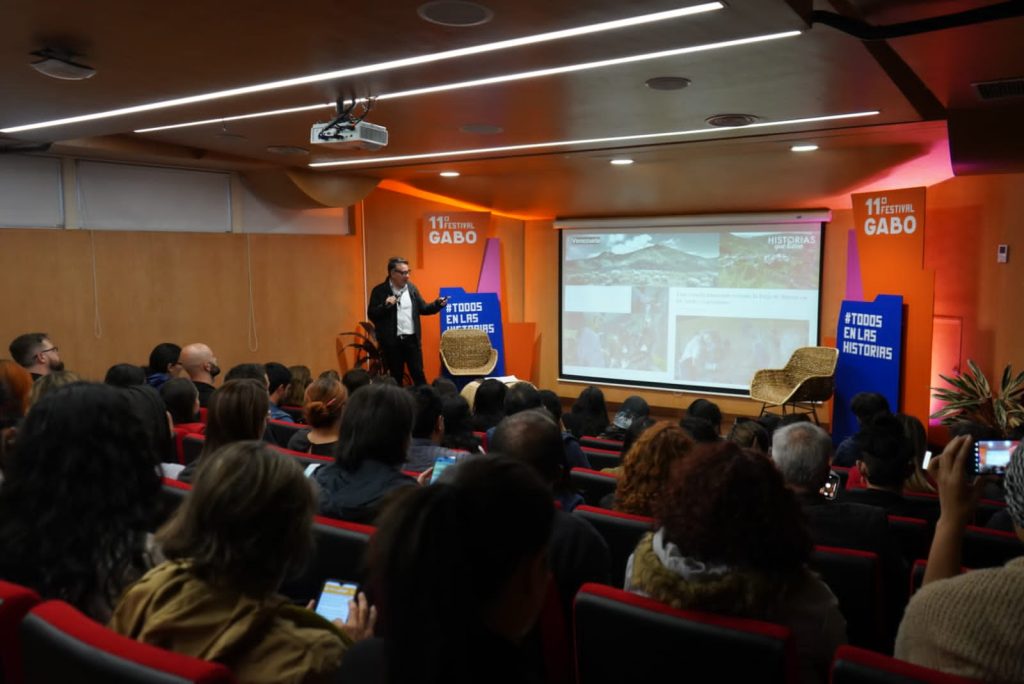Latin America is a region of complex realities and serious problems—but, at the same time, a region that demonstrates how people are responding to their collective challenges with creativity, organization, and innovation. Solutions journalism is a tool that has allowed these stories to be told.
The first training in solutions journalism—rigorous, in-depth journalism that studies responses to societal problems—offered for Latin American journalists took place in October 2018 at that year’s Gabo Festival, held in Medellín, Colombia. The course, taught by Tina Rosenberg and Liza Gross from the Solutions Journalism Network (SJN), was disruptive and motivating for those of us who participated.
Since then, solutions-focused coverage has spread increasingly as a practice present in some newsrooms and specialized media or media outlets with editorial lines that emphasize telling solutions stories have emerged. Drafting in Argentina, Stories that beat in Venezuela and The come out in Paraguay they were pioneers in Latin America. Also notable was the work of Fabrice Le Lous in Costa Rica’s La Nación as a solutions reporter who blazed a trail in Central America.
In 2023, after my appointment as coordinator for Latin America of the SJN, I set out to identify, get to know, and connect journalists, editors, and media outlets that worked with the methodology. This was the first step to build and strengthen a regional SJN network.
This task also allowed me to make a map of Latin America and obtain a panoramic view: today, more than 32 media outlets from 14 countries provide solutions-informed coverage in Latin America. These include independent media such as 9 Millones in Puerto Rico, Proyecto Lava in El Salvador, and El Colectivo 506 in Costa Rica; hyperlocal or specialized projects such as El Otro País from Paraguay, or Amazônia Vox from Brazil; and even large newsrooms such as Folha de São Paulo, also in Brazil.
In the past two years, 23 journalists from Latin America were accredited as Solutions Journalism Network trainers, a valuable team that has carried out at least 150 training activities including courses, conferences, and webinars. These efforts have provided solutions journalism training to approximately 1,500 journalists and journalism students from countries such as Venezuela, Argentina, Colombia, Brazil, Peru, Ecuador, Puerto Rico, Costa Rica, El Salvador, Guatemala, Bolivia, Paraguay and Chile.
Latin American journalism is investigating and documenting the responses to our collective problems. Progress in disseminating the approach is evident. However, there is still a long way to go.
One of the challenges is to influence the expansion of the information agenda of Latin American media so that responses to problems—many of them urgent—become a bigger editorial priority for most newsrooms.
In Latin America, furthermore, in a context of social and political crisis, and in some countries with irrefutable evidence of democratic regression and the rise to power of populist leaders, solutions journalism has even greater power to influence social change in the region.

In my experience in Venezuela, as we experience authoritarian restrictions on freedoms and profound political instability, the solutions approach has made it possible for us to tell stories that reveal how the strength of civil society is laying the foundations for the reconstruction of the social fabric. These efforts are driving innovative change.
Despite the adversities that Venezuelans face, there are hundreds of points of light that shine in the midst of darkness: examples of social transformation that show how citizens, beyond political or ideological differences, successfully manage to resolve many of their problems. Without a doubt, these stories must be shared.
In an increasingly polarized Latin America and with democracies at risk, solutions stories are an alternative that documents organized civil society initiatives and their role in depolarization and social innovation.
In Venezuela, despite the uncertainty generated by the consolidation of a government that does not respect the rules of democracy, we’re seeing an inspiring process of social reorganization and reconciliation take place.
I am convinced that in all of the countries of our region, solutions reporting can help journalists open new channels for dialogue, reconnect with audiences, and combat the narrative of hopelessness.
Many of my colleagues in the region share the opinion that solutions journalism in Latin America is “under construction.” Together, we are collaborating to adapt the approach to the Latin American reality, embracing more complex narratives that provide a greater understanding of the problems faced by the citizens of our countries and how they are being solved. This is not only timely, but necessary.
Solutions journalism is a very useful technique for telling stories of sustainable development that inspire and can be replicated.
It is a challenge in the midst of a regional and global context of economic crisis and recession, and with a media industry also in a sustainability crisis.
The closure this year of Red/Acción in Argentina, a flagship media organization led by Chani Guyot with the participation of several Argentinean members of our SJN network took part—among them, Javier Drovetto, Stella Bin, Florencia Tuchin, and David Flier—is very bad news. It sounds an alert that makes other editors of independent media in Latin America take note. It also heightens our awareness of the prevailing need to be creative and think about alternative business models that guarantee the sustainability of our newsrooms. That’s no easy task.
Despite this setback, when taking stock, I think that we can see positive trends for solutions journalism in Latin America. We have managed to create a growing and increasingly tight community, with a collective and fluid exchange of experiences and ideas that is very enriching. The seeds we’ve sown are beginning to bear fruit.
The challenges remain enormous, but we can already see results. Solutions journalism is already contributing to making our societies more just, promoting a positive impact on our audiences, and creating hope with stories that illustrate that change is possible.





